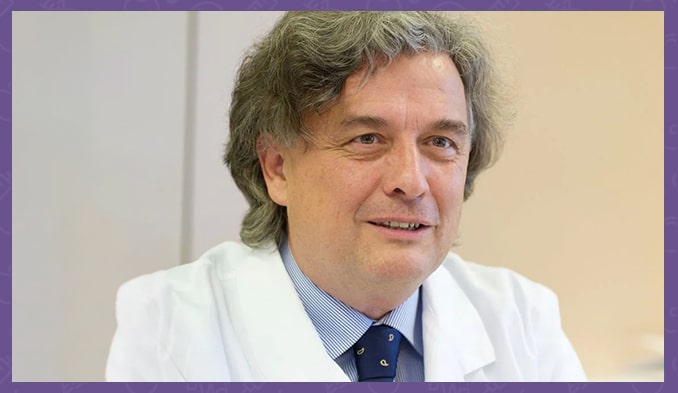Prof. Dr. Anton Luger, is Hashimoto's disease common and what does it involve?
This thyroid disease represents an autoimmune disorder. In it, the body attacks the thyroid gland with cells of the immune system precisely because it cannot recognize it as its own. Its cells are destroyed by a subset of blood cells (special lymphocytes) that infiltrate it. This disease is common, affecting over 10% of the European population. In men, the incidence is lower. They suffer from this autoimmune disease about 10 times less often than women.
Why does it occur and are there risk factors?
There is not enough information as to why the human body sabotages itself by attacking one of its organs. However, a risk factor is a genetic predisposition to this disease. Other risk factors may be:
- viral infections;
- stress;
- drugs;
- irradiation;
- intake of more or less iodine than the body needs.
What are the first symptoms?
Diagnosis of Hashimoto's disease (autoimmune thyroiditis) often occurs incidentally when a patient undergoes neck ultrasonography or prophylactic laboratory tests. Diagnosis often takes time, however, because many of the symptoms are also characteristic of many other diseases and begin to manifest slowly. Such symptoms are:
- drying of the skin;
- nails susceptible to breaking;
- hair thinning;
- facial flushing;
- overweight;
- increased sensitivity to cold;
- fatigue and loss of energy;
- obstruction of the intestinal tract;
- depression and difficulty concentrating;
- reduced heart rate;
- swelling of the thyroid gland;
- pain and weakness in the muscles.
In order to be diagnosed with Hashimoto's disease, what tests need to be done?
Two types of tests are used: laboratory tests and thyroid ultrasonography. Hypothyroidism is a typical condition for the disease. It is expressed in the low concentration of thyroid hormones (free thyroxine T4 and free triiodothyronine T3). In this condition, a decreased level of the pituitary hormone (TSH), which stimulates the production of T4 and T3, is also characteristic. Conversely, levels of thyroid autoantibodies (TPO and Tg) are elevated. When the gland disease is in a chronic stage, it may reduce in size and atrophy. The constellation that occurs before overt hypothyroidism, so-called subclinical hypothyroidism or latent hypothyroidism, is characterized by fT4 and fT3. These indices are the reference values while the pituitary hormone struggles with preventing their elevation and has elevated values.
How is the disease treated and is surgical treatment possible?
The standard therapy is T4 replacement, sometimes in combination with T3. In the case of subclinical hypothyroidism, in most cases, this therapy can be deferred until the TSH exceeds a certain threshold level (10 mU/mL). When pregnancy is desired, T4 replacement targeted at significantly lower levels in women helps to improve fertility as well as reduce the risk for embryo damage in pregnancy. It is not recommended to administer immunosuppressive therapy as it leads to side effects not proven to positively affect disease progression
Is this disease completely curable and what are the consequences?
In Hashimoto's disease, surgical treatment is not feasible. Only in the case of malignant or large nodules is surgical intervention used. There is no such treatment that can fight the disease completely. However, people suffering from the disease lead a life of normal duration. When hypothyroidism is clinically prominent, lifelong replacement therapy with T4 combined with T3 is administered using an oral tablet in the morning on an empty stomach.
There is a higher risk of developing one or more different autoimmune diseases for patients who already have Hashimoto's disease, which include:
- loss of skin pigmentation (vitiligo);
- type 1 diabetes, adrenal insufficiency (loss of cortisol production by the adrenal glands);
- gastrointestinal diseases;
- rheumatological diseases.
Type 1 diabetes, vitiligo, adrenal insufficiency, and other autoimmune diseases can develop from patients suffering from Hashimoto's disease.
About Prof. Dr. Anton Luger
Prof. Dr. Anton Luger is an endocrinologist. He is currently an attending physician at the Wiener Privatklinik and heads the clinical department of endocrinology and metabolism at the Medical University of Vienna. He is included in the Top 4% of the world's top scientists in 2021 Stanford University.
CV and professional development:
- 1971 - 1978: postgraduate studies at the Medical Faculty of the University of Vienna, Austria, where he received his PhD in 1978;
- He started his medical career in the 3rd Department of Internal Medicine at Linz Hospital in Vienna, followed by internships at the Institute of Pharmacology and the Departments of Medicine II and Cardiology at the University of Vienna;
- 1985 - 1986. Prof. Luger received a Max Kade Fellowship for training in developmental endocrinology, National Institute of Child Health and Human Development, National Institutes of Health, Bethesda, Maryland, USA;
- He then returned as senior physician at the Department of Endocrinology and Metabolism, Department III of Medicine, University of Vienna;
- 1995: became Deputy Head and in 2005 Head of this Department.
Current and past positions in international and national scientific and professional:
- President of the Endocrinology Section of the European Union of Medical Specialists (UEMS);
- Member of the Clinical Committee of the European Society of Endocrinology;
- Member of the Nominating Committee of the European Society of Endocrinology;
- Former member of the Executive Board of the European Neuroendocrine Association;
- Former member of the Special Programs Committee of the Endocrine Society (USA);
- Former member of the Diabetes Advisory Group, Endocrine Society (USA);
- Board member of the Austrian Society of Endocrinology;
- Board member of the Austrian Diabetes Society.
Publications:
More than 300 of his scientific papers, in the areas of clinical, basic and translational research, have been published in peer-reviewed journals over the years. He has authored or co-authored more than 230 articles in peer-reviewed journals and several books, as well as serving on the editorial board of journals such as Hormones (associate editor) and Endocrine.




